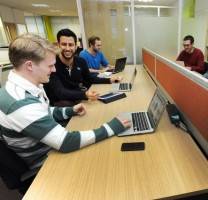January 25, 2019
The state of the workplace right now? Everywhere and nowhere, baby 0
 My trade is to ask questions about the workplace then make sense of the answers. That has been a particular challenge with the question, ‘what are offices today?’ What seems clear is that the various actors in the workplace ecosystem look at offices through very different eyes. Urban planning and development professionals still view offices as a distinct category of real estate and most real estate professionals view offices in terms of the delivery of floor space. Some things have changed,however. For some time, the hybrid economy of serviced offices has turned the product into a service. But, in many cases this has simply made the leasing of space simpler and more flexible.
My trade is to ask questions about the workplace then make sense of the answers. That has been a particular challenge with the question, ‘what are offices today?’ What seems clear is that the various actors in the workplace ecosystem look at offices through very different eyes. Urban planning and development professionals still view offices as a distinct category of real estate and most real estate professionals view offices in terms of the delivery of floor space. Some things have changed,however. For some time, the hybrid economy of serviced offices has turned the product into a service. But, in many cases this has simply made the leasing of space simpler and more flexible.

































February 17, 2019
Landlords must respond in new ways to the changing world of work
by Ben Gillam • Comment, Technology, Workplace design